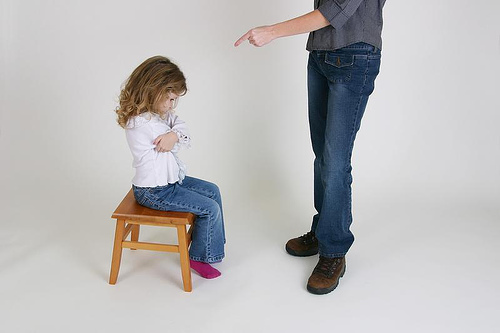theology and child rearing: what is discipline?

Most parents talk about discipline a lot…both as a concept and as a verb. But what is discipline? And is it really something we DO TO our children? When someone says “I had to discipline him for coloring on the wall” and they mean spank, is THAT discipline?
Wikipedia serves us well here:
In its most general sense, discipline refers to systematic instruction given to a disciple. This sense also preserves the origin of the word, which is Latin disciplina “instruction”, from the root discere “to learn,” and from which discipulus “disciple, pupil” also derives.[1]
To discipline thus means to instruct a person or animal to follow a particular code of conduct, or to adhere to a certain “order.” Consequently, “in the field of child development, discipline refers to methods of modeling character and of teaching self-control and acceptable behavior.”
When David and I decided not to use violence in the nurturing and discipline of our children, a huge motivating factor was that we didn’t want external manipulation to always be their guide. We wanted them to develop an internalized sense of “right behavior” that was not derived from fear alone (fear of getting hit by a car is a perfectly acceptable motivator for a child not to run out in the street…but that is a natural consequence, not an imposed manipulator).
So when we looked at the discipline of our children, we thought of it in terms of working with them to shape a path in which behavior was contained, not force compliance in each and every individual behavior. We wanted them to develop a certain character and world view and treatment of the “other” that guided their decisions instead of just always “following the rules”. Now, don’t get me wrong, there are some things that we’ve had to say “this is the way it is” and expect compliance but with the overall philosophy of our parenting, we try to keep the big picture in view.
our theology and child rearing: a history
theology and child rearing: what is discipline?
theology and child rearing: the Bible
theology and child rearing: influence of/on theology
theology and children: conclusion - how I want to live
Related posts:
- theology and child rearing: influence of theology My intention in this little series is 2-fold - to...
- our theology and child rearing: a history When my first-born was about 18 months old my husband...
- theology and child rearing: the Bible To explain why I’m not getting into much detailed Scriptural...
- Child-like innocence I just love how much Shayel talks about Jesus and...
- why “theology” frustrates me When we were attending our previous church, several people started...
Related posts brought to you by Yet Another Related Posts Plugin.
- Posted by Mak at 01:01 pm
- Permalink for this entry
- Filed under: Uncategorized
- RSS comments feed of this entry
- TrackBack URI








I stopped spanking my oldest daughter once she turned 5, which is the age my wife and I felt that our daughter had enough comprehension about the consequences of actions to no longer find spanking a useful method of correction.
You use the word “violence” and “external manipulation” to describe spanking, but how are believers supposed to view Proverbs 13 and Proverbs 23? They both describe physical punishment for a child as a prescribed method. Are these proverbs Godly instruction and timeless wisdom, or are they a throwback to pre-grace living? Or something else?
I would actually say that spanking a little one before the age of 2 is the most disturbing of all to me. So saying you stopped at 5 is really not helpful to me. And developmentally speaking, your logic falls short since there’s not much of a developmental difference (and I’ve worked in child development) between a 4 year old and a 5 year old esp. in the area of logic.
Having said that, please remember my disclaimer, I’m sure you’re a loving kind and generous parent and I don’t judge you as a parent…parenting is hard and the choices we make are our own and I’m sure your kids are just fine I just disagree with your views.
I just disagree with your views.
I’ll expound in a separate post.
The age at which we stopped spanking our child had nothing to do with her reaching a particular age threshold, but rather a maturity threshold. I imagine that the age will be different for our other two younger daughters.
I don’t feel judged, but I also am of the camp that doesn’t believe in a “right” way to parent; I wasn’t suggesting that my way was right. Rather, I was simply sharing.
You may not think there’s a “right” way to parent (I don’t really either), but like me, I would imagine you do have ideas about what’s “wrong”…we’re just different in what we think is wrong
Oh, maybe. It’s also possible that our differing definition of “spanking” might cause some confusion as well.
I think that my perspective on raising children who are meant to become adults rather mirrors my perspective on God’s relationship with his people, starting with God’s “child” Israel, to whom He mets out swift justice and strict regulation, and then to Christ’s “bride” to whom all grace is extended, and the notion of “rules” and “punishment” no longer apply. Until my kids are “of age” (whatever that means), I feel I’m supposed to view them through the lens of the OT, and after that, through the lens of the NT.
I’m still working that out, though. There are obviously ways to read into the text incorrectly (THROW ROCKS AT YOUR CHILDREN!), but I’m of the belief that love and mercy and all that make no sense outside the context of justice and the consequence of disobedience.
I don’t think we have different definitions of spanking - I just choose to call it what it would be called in any other setting - hitting and violence
As for your ideas about the OT and NT - I’ve heard that view and disagree.
And of course there are consequences - I never said there aren’t consequences - I just don’t think yelling, berating or hitting should be among the consequences.
[...] theology and child rearing: a historytheology and child rearing: what is discipline?theology and child rearing: the Bibletheology and child rearing: influence of/on theologytheology [...]